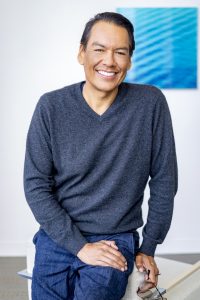
In a 1981 snapshot of Robert Redford and filmmakers — including Chris Spotted Eagle, of the Houmas Nation, and Larry Littlebird, of the Laguna and Kewa Pueblos — a space for indigenous voice in film was born. The Sharon M. Beard photograph documents Sundance Institute’s first Filmmakers Lab, and the subsequent labs and programs have launched a decades-long independent film movement.
By 1994, Sundance Institute had developed initiatives to officially support Native American and indigenous artists, and in 1995, Chris Eyre and Sherman Alexie’s “Smoke Signals” became the first film written and directed by Native Americans presented at Sundance; it won the 1998 Sundance Festival’s Dramatic Audience Award and Dramatic Filmmaker Trophy.
Thirty-eight years after the first Sundance lab, N. Bird Runningwater heads Sundance’s Indigenous Program as director, and he aims to further the legacy of the Redford-founded nonprofit.
“The work that I do is lending toward dismantling a level of invisibility of Native Americans in our own country, and in our own American popular culture,” said Runningwater, who has also received a Woodrow Wilson Foundation Fellowship in Public Policy, and serves on the board of directors of the First Peoples Fund. “That’s what inspires me to do the work that I do.”
Runningwater, who has served as a director and writer himself on several film and television projects, will speak at 10:45 a.m. Wednesday, August 21 in the Amphitheater, continuing Week Nine, “Exploring Race and Culture in America with Wynton Marsalis and Jazz at Lincoln Center.”
Runningwater’s role in one of Sundance’s core programs is vitally important to “supporting indigenous filmmakers in telling their stories and, by doing so, reframing the American story,” said Matt Ewalt, Chautauqua’s vice president and Emily and Richard Smucker Chair for Education.
“During a week in which we look at the intersection of race and culture in American society, Bird Runningwater brings critical insight into how Native Americans are all but invisible in American culture, including cinema,” Ewalt said.
Raised on the Mescalero Apache Reservation in New Mexico, Runningwater will bring his personal story to today’s lecture, as well as insight into how his own tribal histories — Runningwater was born of the Cheyenne and Mescalero Apache peoples — have inspired him in his Sundance directorship. As he endeavors to provide support for native American artists, Runningwater asks: How can Native stories be “made and seen?”
The core goal of Sundance’s Indigenous Program is to provide mentorship and resources to artists who typically have specific projects in the works, Runningwater said. And Sundance’s support manifests itself in a variety of ways — through grants and fellowships and in film labs.
Since 2004, the Indigenous Program’s Native Filmmakers Lab Fellowship has allowed first-time filmmakers space to create short films; each year, the Indigenous Program Full Circle Fellowship brings three U.S.-based Native youth to the Native Filmmakers Lab and Sundance Film Festival; and the Merata Mita Indigenous Women Artist Fellowship grants one Native woman the opportunity and resources to create a feature film.
Named as one of TIME’s 2019 Leaders Who Are Shaping the Next Generation of Artists, Runningwater has helped curate the Sundance premieres of more than 110 indigenous-made films; under his leadership, Sundance’s Indigenous Program has fostered mentorship and support to more than 140 indigenous filmmakers.
Though choosing a favorite project is like “picking your favorite child,” Runningwater said three recent artists to have been part of Sundance’s Indigenous Program, in some capacity, have gone on to establish especially “wonderful careers.” Looking to Diné filmmaker Sydney Freeland of “Hoverboard” fame, Sterlin Harjo and his Oklahoma-set, Native American-based works, and Taika Waititi and his Academy Award-nominated “Two Cars, One Night,” Runningwater described their collective works as “exceptional.”
In all cases, the Indigenous Program is committed to bringing indigenous stories — as told by indigenous people — onto screens and into the forefront of modern film.
“We want to really nurture distinct, authentic voices who are trying to say something different,” Runningwater said.




